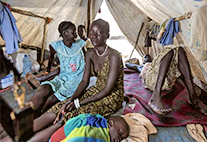Genocide Conference: Climate research offers a new perspective
22 December 2014, by Franziska Neigenfind

Photo: UNHCR/P.Wiggers
Genocide researchers can no longer afford to ignore climate science, according to Prof. Jürgen Zimmerer from the Cluster of Excellence CliSAP...
Genocide researchers can no longer afford to ignore climate science, according to Prof. Jürgen Zimmerer from the Cluster of Excellence CliSAP. The historian, who was also one of the organizers of the Fourth Global Conference on Genocide in Cape Town, South Africa aims to bridge the gap between the research areas genocide and climate change.
“Genocide and Mass Trauma: Rising to the Challenges of Comprehension, Intervention, Prevention and Restitution” – this was the topic discussed at the conference held in Cape Town from 4 - 7 December. Genocide is defined as collective violence that destroys whole ethnic groups. According to Zimmerer, up until the beginning of the 21st century, research in this area mainly concentrated on the Holocaust. It is generally accepted that strong ideology was behind the extermination of the Jewish people in the Second World War, and genocide researchers still consider genocide to be a crime that has no rational explanation.
Zimmerer wants to broaden this classic approach. “As a climate researcher, I study forced migration and acts of violence in war areas, as do genocide researchers. However, I also consider the rational causes of violence, such as dwindling resources,” he explains. If global warming increases the competition for fertile land or clean water, it may lead to a resurgence of past hostilities, which could then escalate into genocide.
The organizers were pleasantly surprised by the range of topics at the conference. Numerous young academics from Africa took the opportunity to present their research. “Conferences like this usually take place in wealthy countries in the Northern hemisphere, and African doctoral candidates and postdocs often can’t afford the travel costs,” stressed Zimmerer. He was delighted to have the chance to meet young scientists from countries such as the Democratic Republic of the Congo, Zimbabwe and Namibia.
Jürgen Zimmerer is a member of the Center for Earth System Research and Sustainability (CEN) at the university and is a researcher in the CliSAP group Climate Change, Security Risks and Violent Conflicts. He is also president of the International Network of Genocide Scholars (INoGS), the world’s largest association of academics working in the field of genocide.
More information
